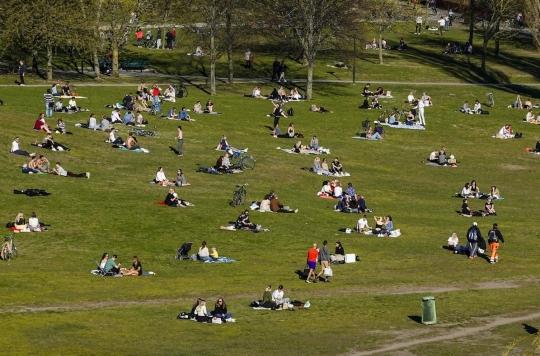Sweden has experienced neither confinement nor the wearing of compulsory masks, and the country has one of the lowest contamination rates in Europe. The virus has hit the country hard and killed 5,880 people. Of these, 90% are over 70 and half have lived in a retirement home.

- In Sweden, the fight against the virus has mainly focused on social distancing and a long-term strategy.
- After being the country with the highest death rate last June, it now has one of the lowest contamination rates.
The Swedish method divides. On the one hand, there are the measures, among the least restrictive, where confinement and the wearing of a mask have not been made compulsory. On the other, there is the balance sheet which shows 5,880 deaths, proportionally more than in France, five times more than its Danish neighbor and ten times more than in Norway. However, the rate of contamination is one of the lowest in Europe. Deaths have concentrated on the most vulnerable people: 9 out of 10 people who died of the virus are over 70 years old and half have lived in a retirement home.
A long-term strategy
Despite the current epidemic rebound which raises fears of a second wave, Sweden is continuing on its own and is even in the process of easing certain measures. To fight against the spread of the virus, Sweden has relied on a rule: physical distance. It is one of the countries that has imposed one of the toughest restrictions on public events with a limit of 50 people. The current situation is pushing the country to loosen the screw and increase this figure to 500 people by mid-October if the trend is confirmed. All this goes in the direction of a strategy envisaged, from the start, in the long term. “We are not going to ask people to wear the mask for years”, estimated Lena Hallengren, Minister of Health, taken up by Le Figaro.
This strategy has not only gained followers. Peter Gustavson, a Swedish citizen who lost his father to Covid at the age of 76, draws up an acknowledgment of failure. “Our society has failed to protect the most vulnerable. We have not succeeded in preventing the coronavirus from reaching them”, he indicated to France 3. The Minister of Health denies any idea of abandoning the most at risk. “We sacrificed no one and did our best to protect the most vulnerableshe replied. In Sweden, nursing homes do not welcome people who come there after retirement. These are care establishments that take care of the most fragile, the sickest. In general, half of them do not survive beyond six months. So, of course, when the Covid enters one of these establishments, it is very complicated.”
Collective immunity reached?
The decision-makers justify these decisions and this method by the desire for consistency in the fight against the virus. “The big difference with other countries is that we have not changed our recommendations, nor the way we organize this social distancingunderlines Anders Tegnell, chief epistemologist of Sweden. We must therefore not yet face the second wave experienced by these countries where we have confined, then deconfined.” The country has launched a major awareness campaign where regular press briefings, two to five per week, are carried out in order to repeat the actions to be taken: “stay home at the slightest symptom, wash your hands, keep your distance, work from home, avoid public transport and for those over 70: isolate yourself!”
At first, the results were not up to par since Sweden was, in June, the country where people were most likely to die from Covid-19. From July, the trend reversed. Today, Sweden has one of the lowest contamination rates, with 42 new cases of Covid per 100,000 inhabitants in the past two weeks, compared to 231 in France. Currently, 130 patients are hospitalized, including around 20 in intensive care, and around two people die of the virus every day. To explain these low figures, Anders Tegnell advances the idea of collective immunity. “There are only two ways to stop an airborne epidemic like the coronavirus: with a vaccine, or by achieving herd immunity. The latter has never been our strategy, although better immunity may be one of the consequences of the measures we take.“, he estimated.

.















